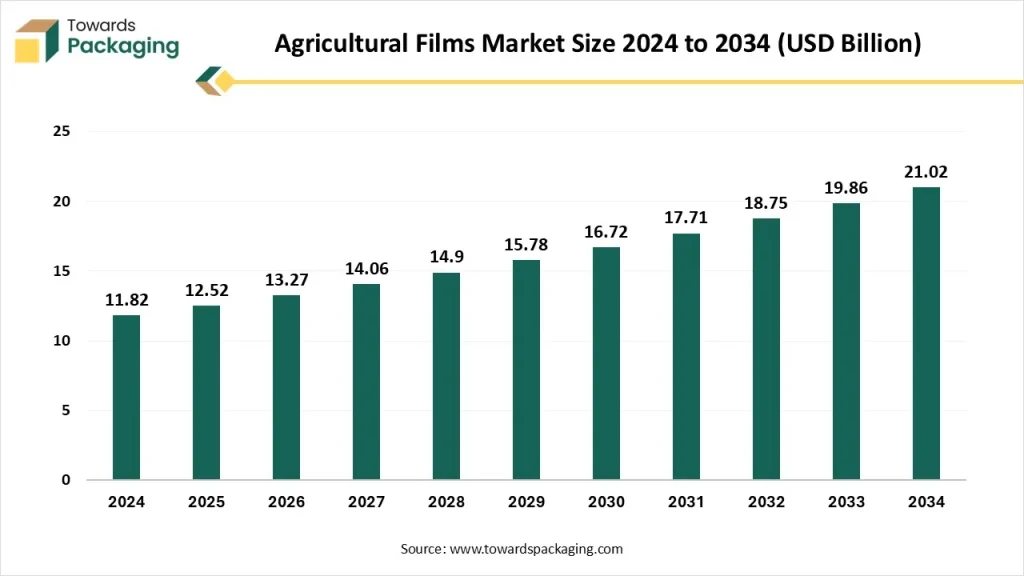Market Outlook: Steady Growth Fueled by Modern Agriculture
The global agricultural films market is on a solid growth trajectory, projected to rise from USD 12.52 billion in 2025 to USD 21.02 billion by 2034, reflecting a CAGR of 5.94% during the forecast period. In 2024, the market stood at USD 11.82 billion, with Asia-Pacific emerging as the dominant regional player, while North America is anticipated to grow at the fastest rate through 2034.

Key Market Insights at a Glance
-
🌏 Asia-Pacific held the largest market share in 2024.
-
🌎 North America is projected to grow at the highest CAGR.
-
🔬 LLDPE was the leading material in 2024.
-
🌱 Mulch films dominated the type segment.
-
🌾 Bale wrapping & ensiling was the top application area.
Driving Forces Behind Market Growth
🌾 Rising Demand for High-Yield Agriculture
With the global population booming, food demand is skyrocketing. Farmers are increasingly turning to modern agricultural techniques, including greenhouse farming, to boost yield. Agricultural films play a vital role by regulating temperature, preserving moisture, and reducing weed growth.
Mulch films have proven especially effective in enhancing soil conditions and crop quality. Meanwhile, tunnel films help shield crops from harsh weather and pests by creating microclimates.
Invest in Our Premium Strategic Solution: https://www.towardspackaging.com/download-databook/5602
Market Constraints: Tackling the Plastic Waste Challenge
Despite their benefits, most agricultural films are still plastic-based, which raises serious environmental concerns. Many governments are tightening regulations to reduce plastic pollution. As a result, manufacturers are exploring biodegradable alternatives such as plant-based plastics to meet both performance and sustainability goals.
A Golden Opportunity: Rise of Plant-Based Biodegradable Films
The shift toward eco-friendly solutions has created a fertile ground for biodegradable agricultural films. These materials decompose naturally, removing the need for labor-intensive cleanup and minimizing the carbon footprint. The growing pressure for sustainable farming is accelerating the adoption of such innovations.
Get All the Details in Our Solutions – Access Report Preview: https://www.towardspackaging.com/download-sample/5602
AI Is Reshaping the Agricultural Films Landscape
🤖 Smarter Greenhouses, Smarter Production
Artificial Intelligence is making waves in this industry—from optimizing greenhouse climates to improving pest and disease detection. On the production side, AI systems help streamline operations, ensuring raw materials are used efficiently and defective films are filtered out before shipping.
AI-powered automation has also improved recycling and waste management processes. Tasks like inventory control and raw material scheduling are now handled with unmatched precision, significantly reducing operational costs.
Segmental Breakdown: What’s Leading and What’s Rising
🧪 Material Segment: LLDPE at the Helm
Linear Low-Density Polyethylene (LLDPE) continues to dominate due to its affordability, availability, UV resistance, and moisture barrier capabilities. EVA (Ethylene Vinyl Acetate) is rapidly gaining ground, especially in greenhouses, thanks to its flexibility and clarity.
🌿 Type Segment: Mulch Films Take the Lead
Mulch films are widely used to retain moisture, regulate soil temperature, and suppress weeds—critical for boosting farm productivity. Greenhouse cover films are the fastest-growing segment, driven by the expansion of controlled-environment farming.
If you have any questions, please feel free to contact us at sales@towardspackaging.com
🧺 Application Segment: Bale Wrapping & Ensiling Reigns
Bale wrapping is crucial for creating airtight conditions to preserve fodder, making it the leading application. Meanwhile, silo bags are gaining traction due to their efficiency in bulk grain storage.
Regional Analysis: Where the Market Stands
🌏 Asia-Pacific: Agricultural Powerhouse
With agriculture forming a large part of countries like India and China, Asia-Pacific naturally leads in consumption. The region’s focus on increasing productivity and reducing chemical usage has led to widespread adoption of films in farming.
🌎 North America: Fastest Growing Region
North America’s growth is driven by advanced technology, the organic farming movement, and AI/IoT integration in agriculture. These innovations are changing the way farming is done, paving the way for rapid market expansion.
Recent Developments Worth Noting
-
January 2024: RKW Group introduced nonwoven film and netting solutions for the agriculture supply chain at Logistica Expo Berlin.
-
March 2024: Kuraray Co., Ltd. expanded its EVAL EVOH plant in Singapore, strengthening its sustainability commitment and global footprint.
Final Thoughts: Toward a Sustainable Agricultural Future
The agricultural films market stands at the intersection of innovation and necessity. As the world grapples with the dual challenge of feeding more people while preserving the planet, sustainable agricultural films offer a viable path forward. With AI integration, eco-friendly materials, and advancing technologies, the industry is poised for transformative growth in the coming decade.
Source : https://www.towardspackaging.com/insights/agricultural-films-market-sizing


